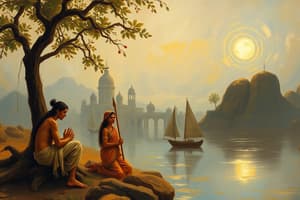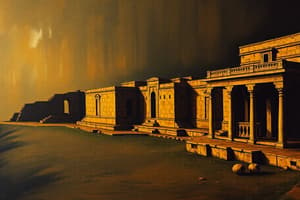Podcast
Questions and Answers
The Gupta Empire introduced a more equitable taxation system and a standardized currency.
The Gupta Empire introduced a more equitable taxation system and a standardized currency.
True (A)
The caste system in ancient India was formalized during the Indus Valley Civilization.
The caste system in ancient India was formalized during the Indus Valley Civilization.
False (B)
Buddhism was founded by Siddhartha Gautama (Buddha) in the 6th century BCE.
Buddhism was founded by Siddhartha Gautama (Buddha) in the 6th century BCE.
False (B)
The Ayurveda, an ancient medical tradition, provided insights into human health and well-being in ancient India.
The Ayurveda, an ancient medical tradition, provided insights into human health and well-being in ancient India.
The Arthashastra, authored by Kautilya, provided a guide to sexuality and love in ancient India.
The Arthashastra, authored by Kautilya, provided a guide to sexuality and love in ancient India.
Flashcards are hidden until you start studying
Study Notes
Ancient India: A Chronological Journey
Delving into the rich tapestry of India's past, we'll trace the rise of civilizations, empires, and philosophies that have shaped the world's oldest continuous culture.
Indus Valley Civilization (2600-1900 BCE)
The first glimpses of sophisticated urban life in ancient India are found in the Indus Valley Civilization, spread across present-day Pakistan and northwest India. Their cities boasted advanced water management, trade, and craftsmanship, as seen in the famous seals, pottery, and well-planned settlements like Mohenjo-Daro and Harappa. The civilization's decline remains a mystery, leaving a legacy of continued archaeological exploration.
Maurya Empire (322-185 BCE)
The Maurya Empire, founded by Chandragupta Maurya, united vast swathes of the Indian subcontinent, making it one of the largest empires in the ancient world. Their reign saw the spread of Buddhism, exemplified in the life and teachings of Ashoka, the great Mauryan ruler. Ashoka's moral and religious guidance, along with the empire's development of trade and administration, paved the way for India's continued flourishing.
Gupta Empire (320-550 CE)
Rising from the ashes of the Maurya Empire, the Gupta Dynasty restored India's political and economic prominence. The Gupta era is renowned for its intellectual and artistic achievements, including the works of poets like Kalidasa, and mathematicians like Aryabhata. The Gupta Empire introduced a more equitable taxation system and a standardized coinage, further cementing its position as an economic powerhouse.
Caste System
The caste system originated in ancient India, organizing society into rigid hierarchies based on ancestry and occupation. Though its roots lie in the Vedic period, the caste structure became more formalized during the Maurya and Gupta Empires. The caste system has evolved over time and continues to shape Indian society to this day, though its rigid aspects have been increasingly challenged and reformed.
Hinduism and Buddhism
Anchored in the rich soil of ancient India, Hinduism and Buddhism emerged as two of the world's major religions. Hinduism, with its diverse pantheon of deities and philosophies, developed from the Vedic period and the Upanishads, becoming India's dominant religion. Buddhism, founded by Siddhartha Gautama (Buddha) in the 5th century BCE, spread across Asia, providing an alternative path to spiritual enlightenment. Hinduism and Buddhism have coexisted and influenced each other for millennia, encouraging ongoing intellectual and spiritual discourse.
Advancements
Ancient India's contributions to the world extend far beyond religion and politics. Notably, the Indian subcontinent was a hub of mathematics, with Aryabhata's work on algebra and trigonometry significantly influencing future scientific advancements. India's ancient medical tradition, the Ayurveda, also provided valuable insights into human health and well-being. The ancient Indian text, the Arthashastra, authored by Kautilya, laid the foundation for public policy and administration, while the Kama Sutra, penned by Vatsyayana, provided a guide to sexuality and love.
The chronology of ancient India has been one of constant evolution, from the Indus Valley Civilization's grandeur to the Maurya Empire's moral compass, the Gupta Empire's intellectual and artistic achievements, and the enduring traditions of Hinduism and Buddhism. The fascinating story of ancient India continues to inspire, as we uncover the nuances and complexities of this vibrant civilization.
Studying That Suits You
Use AI to generate personalized quizzes and flashcards to suit your learning preferences.




